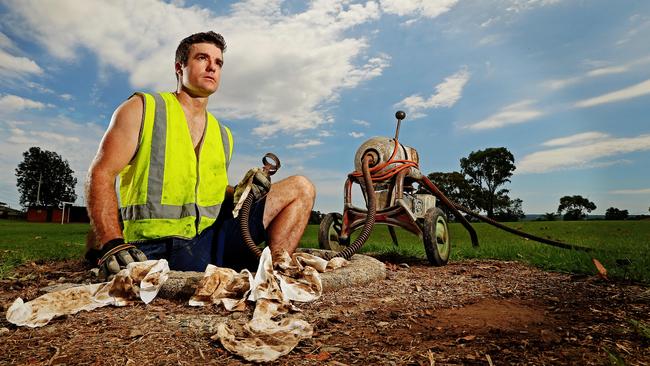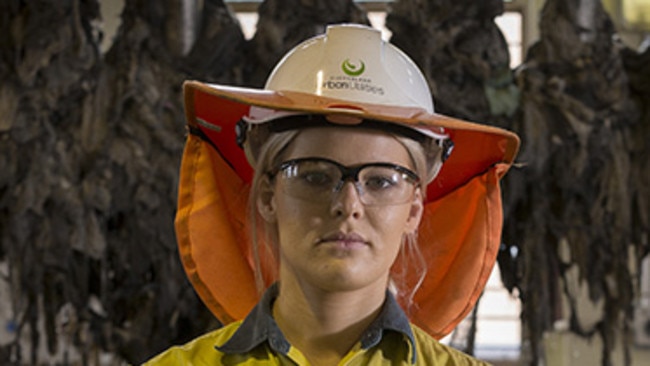Kimberly-Clark banned staff from flushing ‘flushable’ wet wipes down toilets, whistleblower claims
KLEENEX says its flushable wipes, which cause millions of dollars of plumbing damage a year, are just fine. But a whistleblower has revealed the truth.

EXCLUSIVE
KIMBERLY-CLARK once banned staff from flushing its own “flushable” wet wipes down office toilets due to major issues the products caused to the company’s sewerage system, a former employee claims.
The revelation comes as the Kleenex maker stands by its “flushability” claims in the face of a lawsuit brought by Australia’s consumer watchdog, which could result in fines of more than $1 million.
The Australian Competition and Consumer Commission accuses Kimberly-Clark and another manufacturer of misleadingly marketing sanitary wipes as “flushable” and with similar properties to toilet paper.
Australian water utilities spend an estimated $15 million a year removing wet wipes from sewage treatment plants and pumping stations, and households can face plumbing bills in the thousands of dollars.
The Water Services Association of Australia, along with more than 300 international water utilities and partner organisations, have signed a global statement demanding that only the “three Ps — pee, poo and toilet paper” — be flushed.
Pental, which makes White King wipes, said Monday it had removed the word “flushable” from its products earlier this year, but Kimberly-Clark remained defiant.
“Kimberly-Clark stands by the claims we made about the flushability of our Kleenex Cottonelle Flushable Cleansing Cloths, which were supplied up until May 2016,” a spokeswoman said on Monday.
“Our claims that these products are flushable are accurate and the proceedings will be defended on that basis. These products and the current Kleenex Cottonelle Flushable Wipes meet or exceed the requirements set out in the INDA/EDANA Flushability guidelines, which are the only widely accepted guidelines for assessing flushability.”
But a former employee of Kimberly-Clark based in the United States expressed surprise at the company’s position, revealing that hundreds of staff at one office building were banned from using flushable wet wipes in 2014 because they “caused major issues with the sewer system because they did not disintegrate”.
“Their statement was that the building had old plumbing and could not handle 300 people using flushable wipes,” he told news.com.au.
While the former employee said it was not a company-wide edict, the claim raises questions about why Kimberly-Clark continued to market the products as “flushable” when internally it acknowledged they could clog plumbing systems.
A Kimberly-Clark spokeswoman did not deny the 2014 ban. “Given we do not have all the information related to the former employee’s claims, we are not able to comment at this stage,” she said.
The spokeswoman would not confirm whether staff were encouraged to flush wet wipes down company toilets in Australia, saying only that wet wipes were “stocked” in the bathrooms.
“I can confirm that Kimberly-Clark currently stocks Kleenex Cottonelle Flushable Wipes in our offices in Australia,” she said.
“I have also reached out to my colleagues in the United States who have confirmed we also stock our flushable wipes products in our US offices. We stand by the claims we make about the flushability of our Kleenex Cottonelle Flushable Wipes.”
ACCC chairman Rod Sims said Monday that Kimberly-Clark and Pental led consumers to believe the products were suitable to be flushed down household toilets, “when this was not the case”.
“These products did not, for example, disintegrate like toilet paper when flushed,” he said. “Australian water authorities face significant problems when non-suitable products are flushed down the toilet as they contribute to blockages in household and municipal sewerage systems.”
The action stemmed from a complaint lodged by consumer group Choice, which awarded Kleenex a “Shonky Award” in 2015 for its flushable wipes. The group said its tests found the wipes held together for 21 hours, while toilet paper dissolves in a few minutes.
“Consumers rightly expect that a product labelled ‘flushable’ won’t damage their pipes or our waterways,” Choice spokesman Tom Godfrey said.
“The consumer law exists to protect consumers from harmful, misleading advertising and we’re sure that the thousands of people who joined our campaign are pleased to see the law being used to clean up dodgy claims.”
Earlier this week, Shine Lawyers said disgruntled homeowners could have grounds for a class-action lawsuit against Kimberly-Clark and Pental. Shine Lawyers class actions principal Jan Saddler said the law firm would “certainly have a look at it”.
“If people have incurred significant costs in rectifying a problem caused by that product when it’s not consistent with the way that product is marketed and sold to consumers, why wouldn’t we investigate further?” she said.





